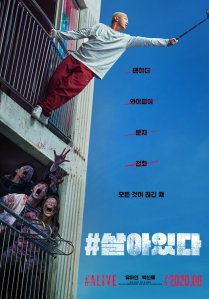
The following is a review of #Alive — Directed by Cho Il-hyung.
Some say that by now the zombie movie genre has been done to death. But, in recent years, I’ve enjoyed watching South Korean films attempt to reanimate it. With Train to Busan and its sequel Peninsula, Yeon Sang-ho revitalized the horror subgenre and gained a worldwide audience. With #Alive, Cho Il-hyung may benefit from the recent interest in South Korean zombie films, as it has recently been given a worldwide platform on Netflix. I’m happy to report that Cho’s film fits right in with the Train to Busan-films as it is a South Korean zombie film that is very easy to recommend to fans of the horror subgenre.
#Alive is directed and co-written (with Matt Naylor) by Cho Il-Hyung and based on Naylor’s screenplay, which has also resulted in an American film titled Alone starring Tyler Posey and Donald Sutherland. #Alive takes place in an apartment complex in Seoul, South Korea, and the film follows Oh Joon-woo (played by Yoo Ah-in), a young gamer, who becomes stuck on his own in his and his family’s apartment during a zombie apocalypse. With little food in his refrigerator, Joon-woo soon becomes despondent, but, when he is at his lowest, he discovers that a woman, Kim Yoo-bin (played by Park Shin-hye), is alive in another apartment, and the opportunity to communicate with her gives him the drive he needs to try to stay alive.
In #Alive, not unlike in Train to Busan, people turn into zombies fairly quickly, and those zombies move at a relatively fast speed. Sometimes when zombies attack in the film, they are accompanied by frustratingly loud and jarring jump-scare noises that can become annoying, but it wasn’t used so much that it really bothered me in the long run. However, the zombies in the film pose a threat, which is important since the film is so focused on the isolation of the main character.
Which brings me to the fact that I was surprised by just how relevant this film felt. Of course, zombie apocalypse films do feel relevant during a pandemic, as I found out when I watched Peninsula in a movie theater earlier this summer. But this film isn’t just relevant because it is about the spread of a disease, it is also extremely relevant because of its focus on a character’s isolation in his apartment and the advantages, and disadvantages, of modern technology.
It is odd that #Alive was released in 2020, while many people around the world still stay mostly at home due to the coronavirus pandemic. As I watched Joon-woo pass out on his couch, play a video game, or Instagram about his situation, it was impossible not to think about how people all over the world have watched a pandemic run amok from the relative comfort of their apartment or house. Elements of Joon-woo’s predicament are very relatable right now, and, to a certain extent, so is his relationship with Yoo-bin. Joon-woo and Yoo-bin are, essentially, distanced socially by a zombie epidemic, and they use technology to communicate and form a bond.
#Alive feels relevant and somewhat relatable, and it features solid performances by Park Shin-hye and rising star Yoo Ah-in (Burning). But, at the same time, I have some issues with the main character, as he, from time to time, acts in ways that are illogical, which is, in a way, a horror movie trope. I also think that some of the events in the film’s third act are not just predictable but clichéd.
Although some of the plot developments in Cho Il-hyung’s #Alive are, admittedly, trite, the focus on modern technology, communication, and the importance of a personal connection during a dangerous epidemic felt both fresh and relatable, which is why I will happily recommend this to horror fans who need something new to watch.
7 out of 10
– Jeffrey Rex Bertelsen.

2 thoughts on “REVIEW: #Alive (2020)”